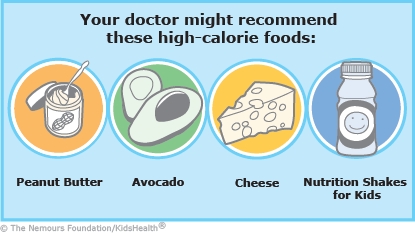Weight Loss: How to Care for Your Child
Weight loss happens when the body burns more energy than it gets from food.


Kids normally gain weight throughout childhood and adolescence. When a child loses weight or is not gaining weight as expected, it means that the body is either:
-
Not getting enough food to supply it with the energy it needs to grow
-
Not properly absorbing calories (energy) and nutrients from food
-
Using more calories than normal
Kids who lose weight from not eating enough might be distracted during meals, have pain with eating (such as with reflux or cavities), be picky eaters, avoid foods with certain textures or smells, fill up on juice, or eat a diet without certain foods (such as being a vegetarian). Weight loss also can be a side effect of certain medicines, a result of an infection, or a sign of a medical or psychological problem.
To figure out the cause of the weight loss, the health care provider examined your child and may have asked about your child's diet, appetite, and eating habits; bowel movements and any changes to them; any other symptoms; and social factors that could be causing stress. The health care provider also might have ordered urine (pee), stool (poop), or blood tests; X-rays; or other tests.
In addition to following the health care provider's instructions for treating any underlying problems that are found, you can take steps at home to help your child gain weight.

-
Your child should eat at least three well-balanced meals and three large snacks (mini-meals) each day.
-
Follow your health care provider's instructions for adding high-calorie foods to your child's diet. This may include foods such as cheese, peanut butter, avocado, cream, gravy, syrup, dressing, milkshakes, and ice cream. The health care provider may recommend special high-calorie drinks or puddings to help supplement your child's diet.
-
Follow your health care provider's instructions for treating any underlying problems that are contributing to your child's weight loss.
-
If your health care provider recommended any vitamin or mineral supplements, give them to your child as directed.

-
The health care provider may ask you or your child to keep a diary of everything your child eats for a few days. This can help your health care provider figure out how many calories your child is eating.
-
Make any follow-up appointments as directed.
-
Your health care provider may refer you to a dietitian, who can help you make changes to your child's diet to help with weight gain.

Your child:
-
Is tired a lot.
-
Continues losing weight.
-
Has belly pain, bloating, gassiness, vomiting, or diarrhea.
-
Is very hungry or very thirsty, even after eating or drinking.
-
Has blood in the urine or stool, nosebleeds, or bleeding gums.
-
Shows signs of an eating disorder, such as binge eating, a fear of gaining weight, or thinking his or her body looks different than it actually does.
-
Appears sad or depressed.
-
Develops other new symptoms, such as fevers, headaches, blurry vision, lightheadedness, rash, constipation, frequent peeing, pain, cough, or weakness.

Your child:
-
Has difficulty breathing, chest pain, or an irregular heartbeat, or passes out.
-
Plans or tries to harm himself or herself or anyone else.
-
Appears dehydrated; signs include dizziness, drowsiness, a dry or sticky mouth, sunken eyes, producing less urine or darker than usual urine, crying with little or no tears.